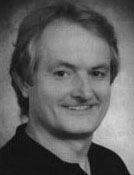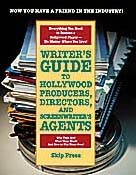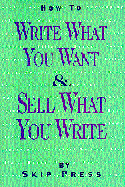Interview with Skip Press
by Claire E. White
 A native Texan who made a successful move to Tinsel Town, screenwriter
and author Skip Press is an avid proponent of the use of the Internet
for writers. And it's no wonder -- his latest book deal was made
as a result of an Internet contact. A prolific writer, in the past few
years he has sold two screenplays
and had numerous screenplays optioned, has written for the childrens'
TV show Zoobilee Zoo, and has produced
a number of home videos including A Woman's Guide to Firearms hosted
by Gerald McRaney, which won the Silver Medal at the New York
International Film Festival. He is the author of numerous books,
including his 8 volume series Star Families for Young Adults, Awesome
Almanac: California, and How to Write What You Want and Sell What
You Write. He is also a journalist and former Editor of the
Los Angeles-based
Entertainment Monthly magazine. His articles have appeared in
numerous national and international magazines, including Boy's
Life, Epicure, Pulp City, The Curious West,
and Writer's Digest, who has dubbed him
its "Cyberscribe". He is a former instructor at the UCLA Extension
Program; his popular screenwriting classes are now taught online.
In his most recent book Writer's Guide to Hollywood Producers,
Directors, and Screenwriter's Agents, he reveals all the secrets for
making the right connections in Hollywood -- even for those who
don't live in L.A. Skip talked with us about screenwriting, the Hollywood
"game" and one of the secrets from his book: the efficient use of
the Internet by a writer to sell his or her work.
A native Texan who made a successful move to Tinsel Town, screenwriter
and author Skip Press is an avid proponent of the use of the Internet
for writers. And it's no wonder -- his latest book deal was made
as a result of an Internet contact. A prolific writer, in the past few
years he has sold two screenplays
and had numerous screenplays optioned, has written for the childrens'
TV show Zoobilee Zoo, and has produced
a number of home videos including A Woman's Guide to Firearms hosted
by Gerald McRaney, which won the Silver Medal at the New York
International Film Festival. He is the author of numerous books,
including his 8 volume series Star Families for Young Adults, Awesome
Almanac: California, and How to Write What You Want and Sell What
You Write. He is also a journalist and former Editor of the
Los Angeles-based
Entertainment Monthly magazine. His articles have appeared in
numerous national and international magazines, including Boy's
Life, Epicure, Pulp City, The Curious West,
and Writer's Digest, who has dubbed him
its "Cyberscribe". He is a former instructor at the UCLA Extension
Program; his popular screenwriting classes are now taught online.
In his most recent book Writer's Guide to Hollywood Producers,
Directors, and Screenwriter's Agents, he reveals all the secrets for
making the right connections in Hollywood -- even for those who
don't live in L.A. Skip talked with us about screenwriting, the Hollywood
"game" and one of the secrets from his book: the efficient use of
the Internet by a writer to sell his or her work.
In your book Writer's Guide to Hollywood Producers, Directors and Screenwriter's Agents you urge screenwriters to get familiar with the Internet and to get online. Why is it so important for a screenwriter to get "wired"?
 Click here for ordering information. |
What resources online should the aspiring screenwriter be familiar with?
All the resources I mention in my book. ;-)
Which are substantial. Can you mention just a couple of categories for our readers?
Particularly the Hollywood Reporter http://www.hollywoodreporter.com, the Writers Guild of America http://www.wga.org, the Internet Movie Database http://www.imdb.com and Carlos de Abreu's Hollywood Network (where I have a page or two) http://www http://www.hollywoodnetwork.com. The WGA site is particularly amazing.
How much do you use the Internet in your work?
I use the Internet all day long, every day. I visit newsgroups and post and read posts. I send and receive 100 emails a day. I download articles, I visit new sites. I've sold my last four major sales via Internet contacts.
How has the "electronic revolution" affected the entertainment industry?
My Hollywood book came via meeting editor Jennifer Sander on AOL, after doing a Member Directory search with the keyword "publisher." The book I'm doing now for Renaissance Books in L.A. came via meeting editor Dick O'Connor online.
| "There's a "personal letter" sort of feeling about emails (properly written emails) that producers will answer, because they can do so immediately--just hit reply and type." |
In your book you suggest to aspiring screenwriters that if they have a great story that they might want to get it published as a book before submitting it as a screenplay. Why is that?
 Click here for ordering information. |
What is a "treatment" of a script and how does it differ from a synopsis used in the book publishing industry?
A treatment used to be a scene by scene description of the movie, with some dialogue thrown in only if it illustrated a key point of the story. That has been bastardized over the years so that a treatment can now be something as small as a few pages which describes the movie, which is a synopsis. If you want to write a real treatment, I suggest writing a full-blown one in the original meaning, which could run 40 pages, up to 80. In the publishing industry, a synopsis is basically the same as in the movie industry. Might be some differences in format, but that's individual preference . There's no *standard* that I'm familiar with. You might be asked for a "one sheet" about a movie idea or script, which is a single-spaced one-page synopsis.
Must a novice have an agent before a producer will look at his or her script?
Not any more. If you can meet a producer personally, that's great, and where Hollywood parties come in. (Better is a small gathering of mutual friends.) And the use of Websites and email and discussion groups is changing that. You will, however, need to have a way of creating a *paper trail* when someone of any stature wants to see your script. You'll need a lawyer or agent to submit your script. If you can get a top agent, you should, however.
What is your opinion of agents who charge reading fees?
Not much.
(Laugh)
I won't pay them, never did.
How does a novice screenwriter go about getting an agent?
The best way is to get a recommendation from another writer already signed by, or who simply knows, that agent. It's a screening process of sorts. How do you meet another writer? By joining writing groups, either in the real world or online, and I don't mean *thank you for sharing* baloney groups. You can subscribe to Written By, the WGA's monthly journal, even if you're not an agent. The Mystery Writers of America is strong, and I believe you can join as an associate member even if you're not qualified to join as a pro. Many top organizations are like that. You meet people more successful than yourself and they like your work and refer you. It's as old as "Noah says you're a good carpenter."
What was your favorite interview and why?
My favorite interview? A tie between Tennessee Williams and Stephen Spielberg? Tennessee because he was so gracious and so damn funny, invited me into his home. Spielberg because he's so in love with what he does and so upfront about it. Spielberg was for Boy's Life, and I quit writing for them after that because I was promised the cover story and the new editor became "new broom sweeps clean" and shoved the story to the middle of the magazine and put an unknown athlete on the cover when the Olympics were going on. Spielberg was expecting the cover and should have had it, since he's a huge Boy Scout supporter and created the cinematography badge.
Tell us about your new online course you are teaching.
My course is an outgrowth of the original course I taught at UCLA, How To Write What You Want And Sell What You Write, which became a published book (now in its 2nd edition) from Career Press. I've taught at several other places, including an art college in San Francisco. Now with my Hollywood book, I feel I can teach anyone the basics of how to get either a book (fiction or non-fiction) or screenplay from start to finish and sold. It ain't a bad deal, this little course of mine, because my students get sold. One student (in Italy) just got a two-book deal.
Can you give us an example of being in "turnaround"?
Turnaround is when your project is taken on by a studio and then abandoned. Let's say a producer options a book, script, whatever from you. Then it goes into "development hell" which means you might rewrite it, the producer might say "Great project, now we have to find a writer" (I'm not kidding), and the project goes through various stages until the person writing the checks at the studio will green-light the project, meaning put it into production. Well, if that exec leaves, or if the market changes, or if someone convinces someone that project isn't right for that studio at that time for any number of reasons, or if the studio runs out of money for projects like yours, they could come back to the producer and say "Sorry, but we're putting the project in turnaround." That means the producer (and/or you) can shop the project at other studios. Sometimes you have to have the next studio that picks it up pay off the costs put into it by the first studio, sometimes not. Depends on the contract.
That sounds quite frustrating!
Sure, but remember some of the greatest successes in movie history, notably Star Wars and E.T., were turned down by the first studios they went to.
Yes, so true. How did you sell your first screenplay?
An old acquaintance whom I didn't know was into movie production read a script I co-wrote with another friend (who got the script to her) and she took it to a friend who sold her boss on it. That same script was the first one I ever had optioned for any substantial amount of money, and I was referred to the producers who took the option by a friend. Personal contacts are how MOST scripts are sold, period.
What is the most common mistake you see made by novice screenwriters?
The most common mistake is taking it personally when someone doesn't like the script.
Tell us about the Hollywood Film Festival.
Carlos de Abreu is an amazing entrepreneur. He was a military pilot in an African country that was taken over by Communists, and there went the family fortune.
| "...if you want to write screenplays and sell them and maybe become a director and/or a producer, you should do all your homework. Read the top books, take classes with the top people, get to know people, build up a network of true friends." |
Sounds like a great event!
Should be wonderful. I'm looking forward to the parties at Le Dome and other places!
What projects are you working on now?
I'm working on selling my new co-written novel Roofers: Low Men in High Places and selling a book by a former student based on the Popol Vuh, the Mayan bible. I'm also writing a book about babies for Renaissance Books in Los Angeles, helping rewrite an independent feature that will start Nestor Carbonell from "Suddenly Susan", and trying to get to rewriting two feature scripts which are under option. It sounds like I'm very busy (which I am), but I always welcome new paying projects.
What is Roofers about?
Roofers is about a bunch of ... OK, you already guessed... who go off pursuing their long-held but rarely-mentioned dreams after one of them wins the lottery. It has to do with blue-collar people who have big dreams (which is just about everyone, I'd say).
Sounds very interesting!
It's like Diner and Tin Men and even Of Mice and Men. One friend of mine thinks it would make a great movie and then a sitcom. I'll know next week if I'm going to sell it to Random House or not.
What have your years in Hollywood taught you?
That if you want to write screenplays and sell them and maybe become a director and/or a producer, you should do all your homework. Read the top books, take classes with the top people, get to know people, build up a network of true friends. Then work as hard as possible to write a GREAT screenplay that comes from your heart but still somehow is commercial. What's commercial? Something that speaks to people's dreams or wish fulfillment, and is also entertaining. If you have to choose one over the other, chose entertaining. If you want to lecture, get a teaching degree, don't write a screenplay. If you write a GREAT screenplay, it will get you work writing other scripts and rewriting other scripts, even if your script isn't produced for a while.
Skip, thank you for coming!
Thank you for having me!
More from Writers Write
Stephen King Quotes
quotes from the master
quotes from the master
Grammar Tips
improve your writing
improve your writing
Writing Prompts
spark your creativity
spark your creativity
